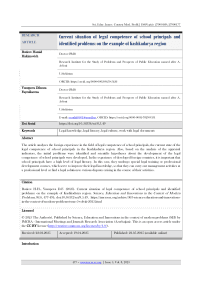Current situation of legal competence of school principals and identified problems: on the example of Kashkadarya region
Автор: Botirov H.H., Yusupova D.F.
Журнал: Science, Education and Innovations in the Context of Modern Problems @imcra
Статья в выпуске: 5 vol.8, 2025 года.
Бесплатный доступ
The article analyzes the foreign experience in the field of legal competence of school principals, the current state of the legal competence of school principals in the Kashkadarya region. Also, based on the analysis of the appraisal indicators, the initial problems were identified and scientific hypotheses about the development of the legal competence of school principals were developed. In the experience of developed foreign countries, it is important that school principals have a high level of legal literacy. In this case, they undergo special legal training or professional development courses, which serve to improve their legal knowledge, so that they can carry out management activities at a professional level or find a legal solution to various disputes arising in the course of their activities.
Legal knowledge, legal literacy, legal culture, work with legal documents
Короткий адрес: https://sciup.org/16010698
IDR: 16010698 | DOI: 10.56334/sei/8.5.49
Текст научной статьи Current situation of legal competence of school principals and identified problems: on the example of Kashkadarya region
RESEARCH ARTICLE Current situation of legal competence of school principals and identified problems: on the example of Kashkadarya region Botirov Hamid Hakimovich < < Doctor (PhD) Research Institute for the Study of Problems and Prospects of Public Education named after A. Avloni Uzbekistan ORCID: Yusupova Dilnoza Fayzullaevna Doctor (PhD) Research Institute for the Study of Problems and Prospects of Public Education named after A. Avloni Uzbekistan E-mail: , ORCID: Doi Serial Keywords X Legal knowledge, legal literacy, legal culture, work with legal documents Abstract
© 2025 The Author(s). Published by Science, Education and Innovations in the context of modern problems (SEI) by IMCRA - International Meetings and Journals Research Association (Azerbaijan). This is an open access article under the CC BY license .
How to develop or improve the legal competence of school principals is unique in each country in terms of its importance in management.
In particular, in the Republic of South Korea , the powers of school principals in labor relations are somewhat limited. In this case, the teacher has no authority to dismiss or otherwise interfere with the violation of his rights. In this case, on the basis of public control, the labor relations of school teachers will be established in coordination with the Ministry of Education of Korea. Otherwise, these issues will be resolved by a court decision.
In Singapore , parents are also involved in the school decision-making process of school principals. Once approved for the position of school principal, they complete a two-year training program at the School Principal Academy. In the first academic year, they develop leadership qualities and increase their legal knowledge, while the second year includes an internship to study school management. In addition, future leaders will be sent to foreign countries for 6 weeks. Principals are usually the first person teachers face in a legal matter. School principals do not have to attend legal education to exercise prophylactic law. Instead, each principal will receive a comprehensive law course in school education, regular legal updates on professional development, user-friendly resources, and in consultation with the district legal advisor.
Legalization of education in Australian schools and. the legal risk strategy should be reflected in school policy and practice, the legal knowledge of school principals is necessary to carry out their work effectively.
In the U.S. state of Texas , school principals are required to take a law course.Education system leaders need to know the law and understand the laws because they must guarantee the legal obligations of teachers and students. The external and internal legal environment of the schools where Tasmanian state school principals operate, the legal fields in which they operate, the existing legal training and development procedures, the legal knowledge and awareness of principals require the existing legal support systems for them.
In New Zealand , school principals are required to have a clearly defined prevention program in place to address risk management issues, which reduces the risk factors that can occur in schools. Legal literate principals are able to effectively manage potential risks in their schools and therefore can implement effective risk management practices.
School principals do not have to go to law school to apply prophylactic law. Instead, each principal will benefit from a comprehensive law course in school education management, regular in-service legal updates, user-friendly resources, and a district legal advisor. Principals should rely on experience as a source of education law. Lack of legal literacy can lead to principals failing to implement appropriate risk management practices to minimize legal issues, which increases the likelihood of litigation against their schools. To avoid legal risk management, principals need to understand education legislation. Directors often draw on their own experience in dealing with legal issues.
Apparently, principals who are not based on education legislation rely on “the experience gained over the years in their management and administrative roles” to address legal issues that arise in their schools . 1
The current state of legal competence of school principals in Kashkadarya region and identified problems
Resolution of the President of the Republic of Uzbekistan dated June 29, 2021 No-5168 "On measures to further improve the activities of legal services to government agencies and organizations." From October 1, 2021, a total of 1182 legal services were reduced and legal service centers under the Ministry of Justice of the Republic of Karakalpakstan, regional and Tashkent city justice departments were established in all districts (cities) of the country and 1056 state units were allocated.
Out of a total of 1,182 abbreviated legal services, 190 are considered to be legal services in the Public Education Departments .

1182 ta
Total reduced legal service states
Ф
190 ta
Reduced legal service states from public education departments
In general, the reduction of states is not directly in favor of public education departments, but it can lead to an increase in violations related to legal issues that arise in their proceedings, that is, to their detriment. This is due to the further development of legal professionals in the field and the share of professionals who improve the legal norms in this area.
Accordingly, the reduction of legal service staff has a direct impact on the formation of the legal competence of the heads of general secondary education institutions.
Today, the legal service for public education and the development of sectoral legal knowledge of public educators are among the most pressing issues. In particular, the most important issue facing general secondary school principals is the development of their legal competence. Inadequate legal knowledge and practice of school principals is being studied as a problem.
It is difficult to achieve efficiency in the system as long as cases of misinterpretation of laws and blind violations by school principals continue to occur.
At present, we analyze the issues related to the insufficient legal competence of school principals and the commission of offenses by them on the example of Kashkadarya region.
In particular, in Kashkadarya region in 2016-2020 (5 years) school principals committed 154 offenses and 233 offenders . In particular:
In Kashkadarya region for 2016-2020 (5 years) 154 cases were filed against school principals and
233 offenses were committed.
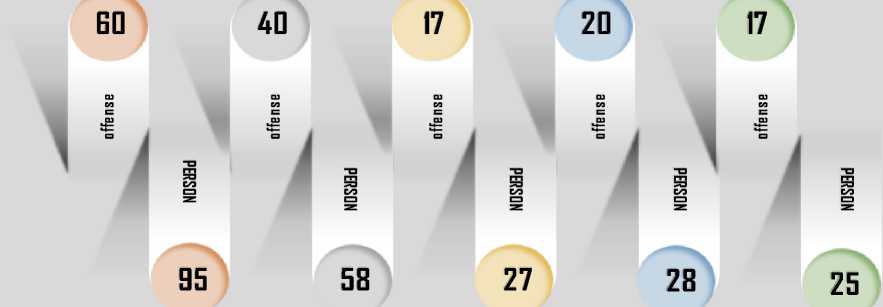
2016 2017 2018 2019 2020
According to statistics, 112 school principals were convicted and 176 were sentenced . Of these, 42 cases and 57 people criminal cases were terminated.
о
♦ XXX I оос ^ о
112 school principals were convicted
Criminal proceedings were terminated against 57 people

Sentence against 176 individuals

42 criminal cases were terminated
If we analyze the offenses of school principals in the districts (cities) of Kashkadarya region for 2016-2020 (5 years), there are changes in the dynamics of their offenses. In particular:
Picture.4. ??????
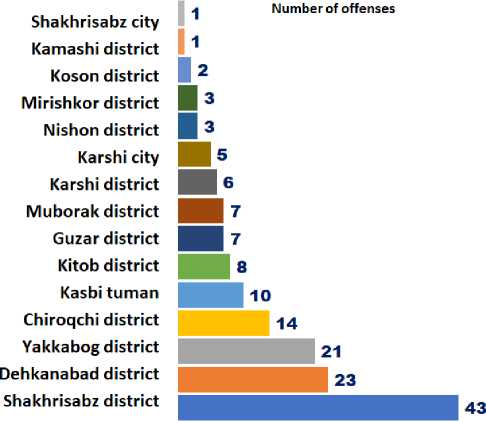
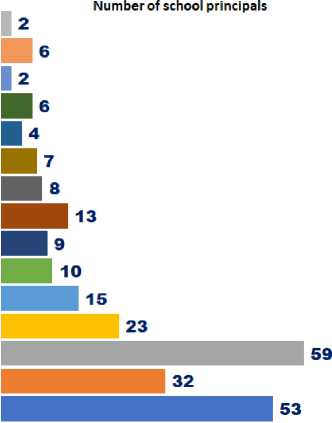
The data show that the highest crime rates are in Dehkanabad, Chirakchi, Shakhrisabz and Yakkabag districts. It is clear from these indicators that the lack of legal knowledge of school principals or the inability to properly apply legal knowledge in their activities leads to the commission of offenses by them.
In particular:
Among school principals in Dehkanabad district
о
23 offenses

3 people were fined

32 people were involved

3 people were House arrested


5 people were imprisoned

5 people were released from punishment
Ди
9 people were sent to correctional work

Coercive measures were applied to 7 people
In Dehkanabad district, 32 people were involved in 23 criminal cases among school principals. Of these, 5 were sentenced to imprisonment, 9 were sent to correctional facilities, 3 were fined, 3 were sentenced to deprivation of liberty, 5 were given a lighter sentence or exempted from additional penalties under Article 57 of the Criminal Code. Coercive measures were applied to 7 individuals under Article 88 of the Criminal Code.
Among school principals in Shahrisabz district
о
43 offenses

2 people were fined

53 people were involved
1 people were House arrested
4 people were imprisoned

21 people were released from punishment
11 people were sent to correctional work
Coercive measures were applied to 11 people
In Shahrisabz district, there were 43 violations among school principals, involving 53 people. Of these, 32 were convicted. Of these, 2 were given suspended sentences, 11 were sentenced to coercive measures under Article 88 of the Criminal Code, 11 were sentenced to correctional labor, 1 was sentenced to deprivation of liberty, 4 were sentenced to imprisonment, 1 was charged under Article 57 of the Criminal Code. a lighter type of punishment was imposed or exempted from additional penalties. Criminal proceedings have been instituted against the remaining 21 school principals.
Among school principals in Kitab district
о
8 offenses
Ie were fined

io people were involved

2 people were released from punishment
1 people were imprisoned
Дй
2 people were sent to correctional work
In Kitab district, school principals were involved in 8 offenses, involving 10 people. Of these, 2 were sentenced to correction, 1 to imprisonment, 5 to fines, 1 to coercive measures under Article 88 of the Criminal Code, and 2 to less severe punishments under Article 57 of the Criminal Code.
Among school principals in Kasbi district
о
Tooo 10 offenses '-o

1 people were fined

15 people were involved
1 people were House arrested

2 people were imprisoned
4 people were sent to correctional work
In Kasbi district, 10 violations were committed among school principals and 15 people were involved, 8 of them were sentenced, 1 of them was fined, 4 were sentenced to correctional labor, 2 were sentenced to imprisonment, and 1 was sentenced to restriction of liberty. Criminal proceedings have been instituted against the remaining 7 school principals.
Among school principals in Yakkabag district


21 offenses
59 people were involved
3 people were imprisoned
5 people were fined

27 people deprived of certain rights
Ди
24 people were sent to correctional work
In Yakkabog district, 21 violations were committed among school principals and 59 people were involved and sentenced. Of these, 5 people were fined, 27 people were sentenced to deprivation of certain rights, 24 people were sentenced to correctional labor, and 3 people were sentenced to imprisonment.
Among school principals in Chirakchi district


14 offenses

8 people were fined

23 people were involved

10 people deprived of certain rights
5 people were sent to correctional work
In Chirakchi district, 14 violations were filed among school principals, and 23 people were involved and sentenced. Of them, 8 people were fined, 10 people were deprived of certain rights, 5 people were sentenced to correctional labor.
The predominance of delinquency among school principals is reflected not in their knowledge of the law, but in their inadequacy or lack of skills related to the application of legal norms. Most of the offenses are related to official crimes, crimes of misappropriation of funds.
There is no clear classification that defines the legal knowledge of school principals. Qualification of legal knowledge means the conscious observance and application of legal norms in any process that may occur in the work of school principals.
In this context, the majority of offenses are committed with a conscious abuse of official authority or under the influence of local authorities. Although general secondary education institutions are subordinated to the Ministry of Public Education, they are subordinated to local authorities in terms of administrative-territorial administration.
A survey was conducted in 6 districts of Kashkadarya region to determine the current state of legal knowledge of school principals and to study the impact on offenses.
The results of survey-experiments conducted in Kashkadarya region show the following indicators.
1. From what sources do you learn the legal knowledge necessary for effective management of the school community?
|
Districts |
Shahrisabz district |
Shahrisabz city |
Yakkabag district |
Kitob district |
Guzar district |
Koson district |
||||||
|
Number of school principals: |
85 |
25 |
102 |
94 |
78 |
102 |
||||||
|
Number of school principals surveyed: |
79 |
20 |
89 |
94 |
67 |
88 |
||||||
|
a) from sources of information dissemination of the Ministry of Justice (Lex.uz); |
9 |
11, 4 |
5 |
25 |
20 |
22, 5 |
18 |
19, 1 |
19 |
28, 4 |
21 |
23, 9 |
|
b) normative legal acts submitted by Ministry of public education and other higher authorities; |
30 |
38 |
8 |
40 |
19 |
21, 3 |
35 |
37, 2 |
27 |
40, 3 |
40 |
45, 5 |
|
c) laws, texts of by-laws, comments on them and special articles published in the media and in the press; |
22 |
27, 9 |
4 |
20 |
24 |
27, 0 |
27 |
28, 7 |
9 |
13, 4 |
13 |
14, 8 |
|
d) "Internet" pages, social networks; |
18 |
22, 8 |
3 |
15 |
26 |
29, 2 |
14 |
14, 9 |
12 |
17, 9 |
14 |
15, 9 |
According to the first question, 38% (30) from Shakhrisabz district, 40% (8) from Shakhrisabz, 37.2% (35) from Kitab district, 40.3% (27) from Guzar district, 45 from Kasan district, 5% (40) school principals said that they learn legal knowledge from the normative and legal documents sent by the Ministry of Public Education and other higher authorities,
I knowledge from regulation and other higher authorities.

while 29.2% (26) school principals from Yakkabag district said that they increase their legal knowledge through Internet sites and social networks.
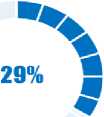
The school principal said that he would increase his legal knowledge on the Internet and social networks.
From Yakkabog district
29.2% (26)
The results of the analysis show that most school principals in these areas are tied to the normative and legal documents coming from the Ministry of Public Education and other higher authorities, and do not have the skills to work with and be aware of legislative innovations.
Therefore, the performance of the National Legislative Database (Lex.uz) shows the lowest level among directors. In particular, in Shakhrisabz district 11.4% (9), in Shakhrisabz 25% (5), in Kitab district 19.1% (18), in Guzar district 28.4% (19), in Kasan district 23.9% (21) , 22.5% (20) school principals in Yakkabag district independently increase their legal knowledge from the National Legislative Database (Lex.uz).

From Yakkabog district
22.5% (20)
In general, when school principals increase their legal knowledge or apply the law, they are largely tied to the tasks of higher organizations and their skills to develop their legal competence independently from other sources are not sufficiently developed.
2. Why do you think the legal knowledge and competence of today’s school leaders is not at the level of demand?
|
Districts |
Shahrisabz district |
Shahrisabz city |
Yakkabag district |
Kitob district |
Guzar district |
Koson district |
||||||
|
Number of school principals: |
85 |
25 |
102 |
94 |
78 |
102 |
||||||
|
Number of school principals surveyed: |
79 |
20 |
89 |
94 |
67 |
88 |
||||||
|
a) does not regularly review the regulations in their field; |
12 |
15, 2 |
7 |
35 |
22 |
24,7 |
19 |
21, 6 |
23 |
24 |
11 |
16, 4 |
|
b) does not work on its own, hardened on the principle of working in the old way. There is no creativity, no aspiration for innovation |
9 |
1.4 |
4 |
20 |
17 |
19,5 |
28 |
31, 8 |
33 |
35 |
19 |
28, 4 |
|
c) does not go beyond the line stated by senior leaders, does not have an independent opinion; |
13 |
16, 5 |
8 |
40 |
26 |
29,9 |
23 |
26, 1 |
20 |
21 |
29 |
43, 3 |
|
d) there is not enough time to study legal knowledge. |
45 |
57, 0 |
1 |
5 |
24 |
27,6 |
18 |
20, 5 |
18 |
19 |
8 |
11, 9 |
According to the second question, 57% (45%) of school principals from Shakhrisabz district answered that they did not have enough time to study legal knowledge, 40% (8) from Shakhrisabz city, 29.9% (26) from Yakkabag district and 43.3% from Kasan district. (29) According to school principals, senior leaders do not go beyond the line, do not have an independent opinion, 31.8% (28) from Kitab district, 35% (33) from Guzar district do not work on themselves, hardened by the old way of working, creativity, they replied that there was no aspiration for innovation.

From Shahrisabz district 57% (45)
According to school principals, they do not go beyond the line said by their superiors and do not have an independent opinion.

School principals responded that there was not enough time to study legal knowledge.
From the Shahrisabz From Yakkabog From Kasan district city district 29.9 % (26) 433% (29)
40% (8)
School principals replied that they do not work on themselves, are stuck on the principle of working in the old way, there is no creativity, no desire for innovation.

From Kitab district
31,аж (as)
From Guzar district 35% (33)
The results of the analysis show that most school principals in these areas are busy with the tasks of senior leaders, do not have independent thinking or work on themselves, have the principle of working in the old way, have no creativity, no desire for innovation.
One of the main reasons for this is that the clerical activities are not normally regulated or the interference of local authorities and higher organizations in the activities of the school.
-
3. What types of rights do you think need to be studied more in order to effectively manage your leadership activities?
Districts
Shahrisabz district
Shahrisabz city
Yakkabag district
Kitob district
Guzar district
Koson district
Number of school
principals:
85
25
102
94
78
102
Number of school principals surveyed:
79
20
89
94
67
88
A) Civil law
17
21,5
7
35
20
20,2
21
23,9
33
35,1
9
13.4
B) Economic law
15
19,0
6
30
23
25,8
27
30,7
24
25,5
17
25,4
C) Labor law
30
38, 0
3
15
27
30,3
29
33,0
18
19,1
36
53,7
d) Administrative law
17
21,5
4
20
16
18,0
11
12,5
19
20,2
5
7,5
On the third question, 38% (30), 30.3% (27), 33% (29), 53.7% (36) of school principals from Shakhrisabz district, Yakkabag district, Kitab district, and Kasan district believe that there is a need to study labor law, 35% (7) from Shahrisabz and 35.1% (33) from Guzar district believe that there is a need for more study of civil law.

38%(30)
35% (7)
From Yakkabog district 3°-3 % (271
ilieve there about civil law.
Analyzes show that in the work of most school principals, labor law is more involved in labor relations, as well as some relations of labor law are violated. In particular, non-compliance with the law in concluding employment contracts with employees, forced labor, non-compliance with working hours, errors in hiring or firing orders, lack of collective bargaining in some schools are observed in the activities of school principals.
Therefore, according to the results of the survey, 4 out of 6 districts, most school principals need to increase their legal knowledge on the application of labor legislation in their work.
In addition, the provision of paid services in the work of school principals is developing, with the need to study civil law for school principals, as the organization of extracurricular activities, the lease of vacant school buildings and other contractual relations are related to civil law.
-
4. How did you legally resolve a problem situation with an employee in your work?
Districts
Shahrisabz district
Shahrisabz city
Yakkabag district
Kitob district
Guzar district
Koson district
Number of school principals:
85
25
102
94
78
102
Number of school principals surveyed:
79
20
89
94
67
88
A) Considered in conjunction with the team
13
16, 5
5
25
35
39, 3
27
30, 7
41
43, 6
22
32, 8
B) Legal action has been taken
10
12, 7
4
20
18
20, 2
23
26, 1
15
16, 0
7
10, 4
C) Resolved through humanity
31
39, 2
7
35
20
22, 5
25
28, 4
25
26, 6
29
43, 3
d) This situation complicates my activity.
25
31, 6
4
20
16
18, 0
13
14, 8
13
13, 8
9
13, 4
On the fourth question, 39.2% of school principals from Shakhrisabz district (31), 35% from Shakhrisabz city (7), 43.3% (29) from Kasan district answered that they resolve disputes in a humane way, and 39.3% from Yakkabag district. (35), 30.7% (27) from Kitab district, and 43.6% (41) from Guzar district said that school principals would handle disputes with the community.
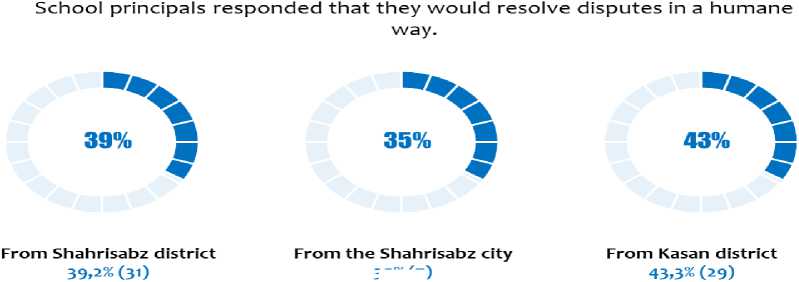
35Ж (7)
School principals say they will discuss disputes with the community

From Yakkabog district From Guzar district From Kitab district
39-3 ^ (35) 43-6% (41) зо,7Ж (27)
Dispute resolution issues mainly require the presence of communication skills, which is a manifestation of the director’s legal competence. It is a practical attribute that is very important for school principals who are now professionals in their field. It is important for the manager to be aware of and be able to explain the legal implications that may arise in resolving disputes.
-
5. Which items of the Resolution No. PQ-3907 of August 14, 2018 are being implemented in your institution? (compulsory labor, subscription, raising the status of a teacher)
Districts
Shahrisabz district
Shahrisab z city
Yakkabag district
Kitob district
Guzar district
Koson district
Number of school principals:
85
25
102
94
78
102
Number of school principals surveyed:
79
20
89
94
67
88
A) Execution is fully secured
9
11,4
3
17
19
21,3
11
12,5
41
43,6
7
10,4
B) Partially secured
26
32,6
7
33
30
33,7
24
27,3
24
25,5
22
32,8
C) Only clauses 3.4.5.16 are provided
19
24,3
4
20
18
20,2
21
23,9
15
16,0
23
34,3
d) Forced labor by local authorities
25
31,6
6
30
22
24,7
32
36.4
14
14,9
15
22,4
On the fifth question, 32.6% (26) from Shakhrisabz district, 33% (7) from Shakhrisabz, 33.7% (30) from Yakkabag district, 32.8% (22) from Kasan district were partially executed. 43.6% (41) of the district responded that the decision was not fully implemented. In Kitab district, 36.4% (32) school principals report forced labor by local authorities.
School principals responded that the execution of the decision was partial.
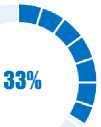


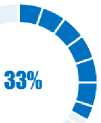
From Shahrisabz district
32,6% (26)
From Yakkabog district
33,7 Ж (30)
From the Shahrisabz city 33-7 % (7)
From Kasan district
32,8% (22)

From Kitab district
36,1г (32)
School principals claim that they are being forced into forced labor by local authorities

School principals responded that inforcement of the ecision was not fully enforced
From Guzar district 43-6* (41)
Analysis of the results of the survey shows that in accordance with paragraph 7 of the Resolution of the President of the Republic of Uzbekistan dated August 14, 2018 No PP-3907 "On measures to bring up young people spiritually, morally and physically harmoniously, to raise their education system to a qualitatively new level." Despite the strict prohibition of employment, there are cases of local authorities forcing school principals to work outside the scope of their official duties. This is due to the fact that school principals abuse their authority, do not know their rights and responsibilities, or knowingly violate the law, do not think about the consequences, and approach their work with indifference and irresponsibility.
It is the local authorities that are forcing school principals to take these actions. Execution of the decision by them is not observed at all, as well as grossly violated.
As long as this situation is repeated among school leaders, an unhealthy internal environment, aimless and inefficient activities, conflict management, a whole system without results will emerge.
-
6. Did you have sufficient legal knowledge in the in-service training system?
Districts
Shahrisabz district
Shahrisabz city
Yakkabag district
Kitob district
Guzar district
Koson district
Number of school principals:
85
25
102
94
78
102
Number of school principals surveyed:
79
20
89
94
67
88
A) Yes, I got it
9
11,4
2
10
19
21,3
11
12,5
39
41,5
7
12,3
B) No, I didn’t
25
31,6
6
30
22
24,7
32
36,4
16
17,0
22
38,6
C) In part, I got it
20
25,3
3
15
20
22,5
21
23,9
15
16,0
15
26,3
d) I wanted to have more.
25
31,6
9
45
30
33,7
24
27,3
24
25,5
23
40,4
On the sixth question, 31.6% (25) from Shakhrisabz district, 36.4% (32) from Kitab district did not have legal knowledge, 31.6% (25) from Shakhrisabz district, 45% (9) from Shakhrisabz city. ), 33.7% (30) from Yakkabag district, 40.4% (23) from Kasan district would like to have more legal knowledge in the system of in-service training.
School principals responded that they did not have legal knowledge from the in-service training svstem


From Shahrisabz district
From Kitab district
36,4* (32)
31,6% (25)
School principals responded that they would like to have more legal knowledge in the in-service training system

From Shahrisabz district From Yakkabog district From the Shahrisabz city From Kasan district
31,6^(25) 33-7^(30) 45^(9) 40,4^(23)
In Guzar district, a maximum of 41.5% (39) school principals answered that they had sufficient legal knowledge in the system of in-service training.

School principals responded that they had sufficient legal knowledge in the inservice training system
From Guzar district 41-5% (39)
These figures were also relatively responsive. In general, there is no in-service training system that directly enhances the legal knowledge of school principals. In addition, there are no clear standards for the legal knowledge of school principals and their components have not been formed.
Therefore, due to the fact that the scope of legal knowledge of school principals is not clear at present, they have problems with the need to develop their legal knowledge.
In particular, the management activities and powers of school principals, the processes associated with educators, or the relationships that may arise with students, all of these are undefined.
Scientific hypothesis on the development of legal competence of school principals
It is necessary to develop a clear classification that defines the legal knowledge of school principals. Qualification of legal knowledge means the conscious observance and application of legal norms in any process that may occur in the course of the work of school principals.
The main part of the offenses should be limited to the influence of local authorities in order to prevent a conscious abuse of official authority.
Most school principals are bound by regulations from the Ministry of Public Education and other higher authorities. Developing skills to work with and be aware of legal news It is necessary to increase the legal knowledge of school principals to work with the National Legislative Database (Lex.uz) or the telegram bot "Legal Advice on Ministry of public education-MPE" or to develop their own legal competence.
For some school principals, it is advisable to set the task of top managers to a minimum, which allows them to think independently or work on themselves, to work in a new way, to be creative, to strive for innovation.
In the work of school principals, labor legislation should be more involved in labor relations, as well as the organization of periodic training on certain aspects of labor law. In particular, it is necessary to pay special attention to the conclusion of employment contracts with employees, the involvement of employees in forced labor, working hours, recruitment or dismissal orders.
In addition, the provision of paid services in the work of school principals is developing, with the need to study civil law for school principals, as the organization of extracurricular activities, the lease of vacant school buildings and other contractual relations are related to civil law.
Dispute resolution issues need to develop communication skills, which is primarily a manifestation of legal competence. It is a practical attribute that is very important for school principals who are now professionals in their field. It is important for the manager to be aware of and be able to explain the legal implications that may arise in resolving disputes.
It is necessary and necessary to strengthen the implementation of paragraph 7 of the Resolution of the President of the Republic of Uzbekistan dated August 14, 2018 No PP-3907 "On measures to bring up young people spiritually, morally and physically harmoniously, to raise the education system to a qualitatively new level" It is advisable to increase the level of responsibility.
It is necessary to reconsider or, if necessary, develop mechanisms to limit the powers of these local governments, which would force school principals to take such action.
In general, it is necessary to establish a specially structured professional development that will directly increase the legal knowledge of school principals. It also requires the development of clear standards that define the legal knowledge of school principals and the formation of their components.
Therefore, it is now necessary to define the scope of legal knowledge of school principals and, as a result, to develop a concept for the development of legal knowledge.
This concept covers school principals' management activities, teacher-related processes, or possible relationships with students.
In conclusion, these scientific assumptions can serve as an example of the current state of legal competence of school principals in Kashkadarya region, the identified problems and their further finding specific solutions, elimination and prevention of violations among them.

